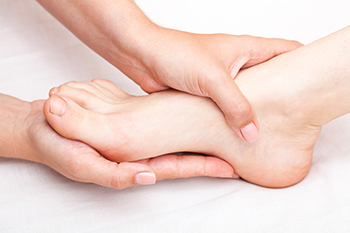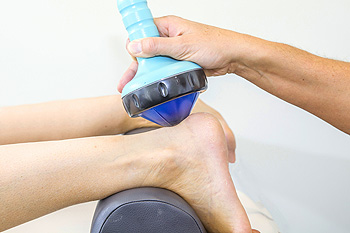Items filtered by date: April 2021
Two Forms of Hyperhidrosis
 When the feet sweat profusely, it is referred to as plantar hyperhidrosis. Many patients find it is an uncomfortable and embarrassing condition and it may even cause difficulty in participating in social events. There are two types of this condition. The most common form is called primary focal hyperhidrosis and this type occurs when the nerves responsible for signaling your sweat glands become overactive. Research has indicated this form may be caused by genetic factors, or it can possibly develop from excess emotional stress. The less common form, called secondary hyperhidrosis occurs when excess sweating is due to a medical condition like diabetes, low blood sugar, thyroid problems, heart attack, or nervous system disorders. Mild relief may be found when inner soles are worn, and powder is used inside the shoes as this may help to absorb a large amount of sweat. If you notice your feet are sweating more than normal, it is suggested that you consult with a podiatrist who can guide you toward the correct treatment methods.
When the feet sweat profusely, it is referred to as plantar hyperhidrosis. Many patients find it is an uncomfortable and embarrassing condition and it may even cause difficulty in participating in social events. There are two types of this condition. The most common form is called primary focal hyperhidrosis and this type occurs when the nerves responsible for signaling your sweat glands become overactive. Research has indicated this form may be caused by genetic factors, or it can possibly develop from excess emotional stress. The less common form, called secondary hyperhidrosis occurs when excess sweating is due to a medical condition like diabetes, low blood sugar, thyroid problems, heart attack, or nervous system disorders. Mild relief may be found when inner soles are worn, and powder is used inside the shoes as this may help to absorb a large amount of sweat. If you notice your feet are sweating more than normal, it is suggested that you consult with a podiatrist who can guide you toward the correct treatment methods.
If you are suffering from hyperhidrosis contact Gary Cockrell, DPM of Tennessee. Our doctor can provide the care you need to attend to all of your foot and ankle needs.
Hyperhidrosis of the Feet
Hyperhidrosis is a rare disorder that can cause people to have excessive sweating of their feet. This can usually occur all on its own without rigorous activity involved. People who suffer from hyperhidrosis may also experience sweaty palms.
Although it is said that sweating is a healthy process meant to cool down the body temperature and to maintain a proper internal temperature, hyperhidrosis may prove to be a huge hindrance on a person’s everyday life.
Plantar hyperhidrosis is considered to be the main form of hyperhidrosis. Secondary hyperhidrosis can refer to sweating that occurs in areas other than the feet or hands and armpits. Often this may be a sign of it being related to another medical condition such as menopause, hyperthyroidism and even Parkinson’s disease.
In order to alleviate this condition, it is important to see your doctor so that they may prescribe the necessary medications so that you can begin to live a normal life again. If this is left untreated, it is said that it will persist throughout an individual’s life.
A last resort approach would be surgery, but it is best to speak with your doctor to find out what may be the best treatment for you.
If you have any questions please feel free to contact our offices located in Brentwood and Madison, TN . We offer the newest diagnostic and treatment technologies for all your foot and ankle needs.
Are Bunions Affecting Your Everyday Life?
How Orthotics Can Help Prevent Running Injuries
Runners’ feet can take a beating striking the ground roughly 800 times for every mile they run. Even the best running shoe may not offer the support and cushioning necessary to avoid pain or overuse injuries to the arches and heels such as plantar fasciitis, Achilles tendonitis, sesamoiditis, stress fractures, metatarsalgia, and more. The lack of proper foundational support leading to these conditions can also negatively affect knees, hips, and the lower back. Custom orthotics may prevent and also treat overuse injuries and can even correct imbalances in a runner’s stride which can lead to foot pain and other issues. If you are a runner, consider contacting a podiatrist who can examine your feet, create custom orthotics to support your individual foot structure and address your specific foot condition.
Sports related foot and ankle injuries require proper treatment before players can go back to their regular routines. For more information, contact Gary Cockrell, DPM of Tennessee. Our doctor can provide the care you need to keep you pain-free and on your feet.
Sports Related Foot and Ankle Injuries
Foot and ankle injuries are a common occurrence when it comes to athletes of any sport. While many athletes dismiss the initial aches and pains, the truth is that ignoring potential foot and ankle injuries can lead to serious problems. As athletes continue to place pressure and strain the area further, a mild injury can turn into something as serious as a rupture and may lead to a permanent disability. There are many factors that contribute to sports related foot and ankle injuries, which include failure to warm up properly, not providing support or wearing bad footwear. Common injuries and conditions athletes face, including:
- Plantar Fasciitis
- Plantar Fasciosis
- Achilles Tendinitis
- Achilles Tendon Rupture
- Ankle Sprains
Sports related injuries are commonly treated using the RICE method. This includes rest, applying ice to the injured area, compression and elevating the ankle. More serious sprains and injuries may require surgery, which could include arthroscopic and reconstructive surgery. Rehabilitation and therapy may also be required in order to get any recovering athlete to become fully functional again. Any unusual aches and pains an athlete sustains must be evaluated by a licensed, reputable medical professional.
If you have any questions please feel free to contact our offices located in Brentwood and Madison, TN . We offer the newest diagnostic and treatment technologies for all your foot and ankle needs.
What is Extracorporeal Shock Wave Therapy?
For people suffering with chronic plantar fasciitis which has not responded to traditional treatment, Extracorporeal Shock Wave Therapy may be an option. Extracorporeal refers to something outside of the body, and in this case, Extracorporeal Shock Wave Therapy (ESWT) is a non-invasive alternative to surgery that may offer relief. In ESWT, ultrasound is used to find the location of the damage to the plantar fascia, and a calibrated current of shock waves is targeted directly into this area to facilitate the creation of new tissue cells and eventual healing. Contact a podiatrist to see if you may be a good candidate for ESWT.
Shockwave therapy is a treatment commonly used to treat various injuries and conditions, particularly plantar fasciitis in the feet. To learn more, consult with Gary Cockrell, DPM from Tennessee. Our doctor can provide the care you need to keep you pain-free and on your feet.
Shockwave Therapy
Shockwave therapy is a new treatment option designed to treat bone conditions such as tennis elbow, shoulder pain, and others. Shockwave therapy uses high intensity sound waves that are directed to the affected tissues of the body with pinpoint accuracy. The effects are very beneficial, leading to a production of collagen fibers, eliminating inflammation.
Who Benefits from Shockwave?
Shockwave is recommended for patients suffering from heel pain and associated problems. Heel pain is a common condition which can be caused by obesity, overexertion, and spending a substantial amount of time on hard floors with your feet exposed and unsupported.
Fast and Easy
The therapy is actually a simple process that can leave patients feeling better the very next day. Shockwave therapy is not as dramatic as it sounds. It enables more blood flow to effected areas, addressing the source of the problem and allowing treatment to last for a long time.
Treatment & Recovery Time
Shockwave treatment will enable your feet to recover quickly. This is especially important since surgery is not required. It is cost effective and does not require the use of anesthesia. This treatment is a better option to surgery, since it is proven safe.
If you have any questions, please feel free to contact our offices located in Brentwood and Madison, TN . We offer the newest diagnostic and treatment technologies for all your foot and ankle needs.
Can Children Get Plantar Warts?
 The papillomavirus is responsible for warts in both adults and children. Although pediatric warts are said to be more common, anyone can become affected. Warts are usually not painful unless they occur on the soles of the feet, as is the case with plantar warts. These flat, thick, callus-like warts can grow singularly or even in a cluster, causing a “mosaic” on the bottom of the feet. Sometimes small black dots, which are clotted blood vessels, may be visible within the wart. While warts usually go away after some time, they can be quite tender and stubborn. If your child has developed plantar warts that are painful or persistent, it is suggested that you make an appointment with a podiatrist. A podiatrist can use a variety of medicines and treatments depending on the severity of the warts, your child’s age, medical history, and tolerance for medical procedures.
The papillomavirus is responsible for warts in both adults and children. Although pediatric warts are said to be more common, anyone can become affected. Warts are usually not painful unless they occur on the soles of the feet, as is the case with plantar warts. These flat, thick, callus-like warts can grow singularly or even in a cluster, causing a “mosaic” on the bottom of the feet. Sometimes small black dots, which are clotted blood vessels, may be visible within the wart. While warts usually go away after some time, they can be quite tender and stubborn. If your child has developed plantar warts that are painful or persistent, it is suggested that you make an appointment with a podiatrist. A podiatrist can use a variety of medicines and treatments depending on the severity of the warts, your child’s age, medical history, and tolerance for medical procedures.
Plantar warts can be very uncomfortable. If you need your feet checked, contact Gary Cockrell, DPM from Tennessee. Our doctor will assist you with all of your foot and ankle needs.
About Plantar Warts
Plantar warts are the result of HPV, or human papillomavirus, getting into open wounds on the feet. They are mostly found on the heels or balls of the feet.
While plantar warts are generally harmless, those experiencing excessive pain or those suffering from diabetes or a compromised immune system require immediate medical care. Plantar warts are easily diagnosed, usually through scraping off a bit of rough skin or by getting a biopsy.
Symptoms
- Lesions on the bottom of your feet, usually rough and grainy
- Hard or thick callused spots
- Wart seeds, which are small clotted blood vessels that look like little black spots
- Pain, discomfort, or tenderness of your feet when walking or standing
Treatment
- Freezing
- Electric tool removal
- Laser Treatment
- Topical Creams (prescription only)
- Over-the-counter medications
To help prevent developing plantar warts, avoid walking barefoot over abrasive surfaces that can cause cuts or wounds for HPV to get into. Avoiding direct contact with other warts, as well as not picking or rubbing existing warts, can help prevent the further spread of plantar warts. However, if you think you have developed plantar warts, speak to your podiatrist. He or she can diagnose the warts on your feet and recommend the appropriate treatment options.
If you have any questions please feel free to contact our offices located in Brentwood and Madison, TN . We offer the newest diagnostic and treatment technologies for all your foot and ankle needs.



